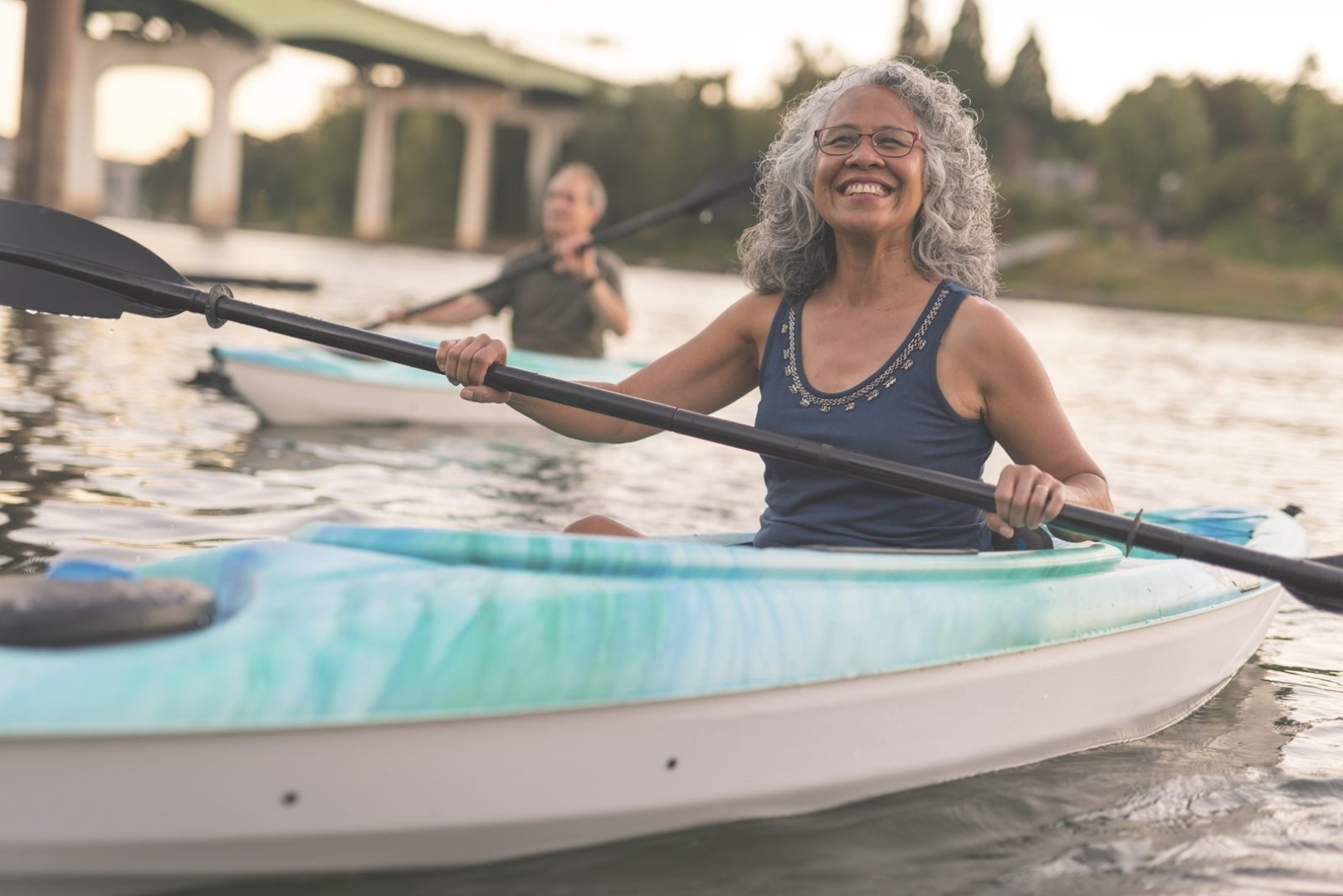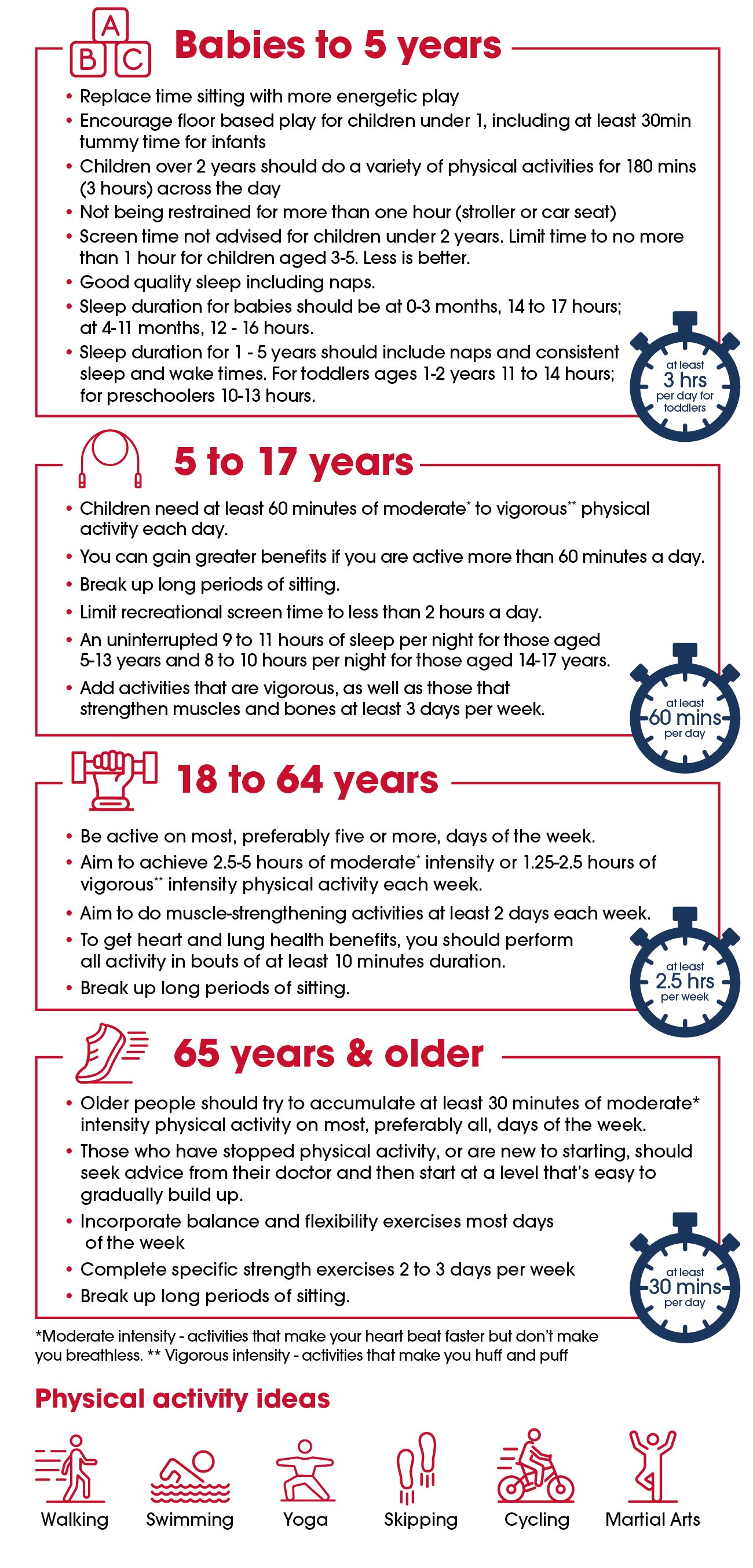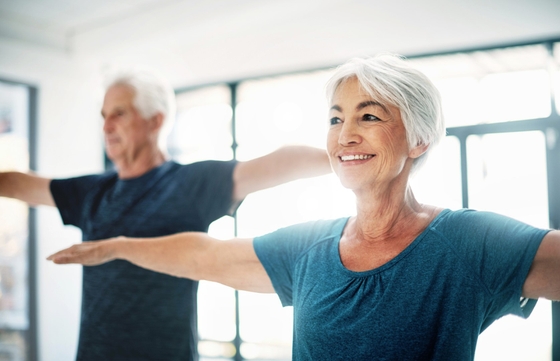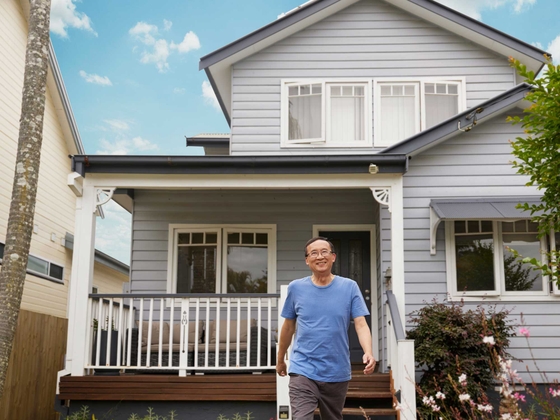
Physical activity and your heart health
Physical activity and exercise can benefit your heart, body and mind.
Key takeaways
- Being physically active includes everyday movements (e.g. walking) and exercise.
- Regular physical activity has many benefits for your health, both now and in the future.
- Simply doing activities you enjoy is a great way to start on the path to better heart health.
- As little as 10 minutes of physical activity a day can be good for your health.
- You can increase your physical activity at any age and just about any level of fitness.
Regular physical activity is one of the best things you can do for your heart health. Increasing your physical activity from as little as 10 minutes a day to the Australian Government’s recommended 30 to 45 minutes a day, five or more days of the week can help reduce your risk of heart disease and heart attacks. It can also prevent and manage many conditions and diseases, including some cancers, type 2 diabetes and depression.
What exactly is ‘physical activity’?
- Physical activity – Daily actions, such as walking to the shops, taking the stairs, getting off public transport and walking to your destination.
- Exercise – Organised activities and sports, such as swimming, cycling, yoga and walking groups (e.g. Heart Foundation Walking Program).
You can increase your daily physical activity without joining a gym or even breaking a sweat. The good news is you can simply do more of the activities you enjoy every day, like walking.
Why is physical activity and exercise good for your heart?
Building up your physical activity to the recommended level has many benefits. By making your heart work a little harder, you can cut your risk of heart disease by a third – regardless of your age, gender, income or where you live.
Learn more about the benefits of physical activity
How does physical activity help your body?
- Physical activity is good medicine. It can help reduce heart disease risk factors, such as high blood pressure and cholesterol. If you have heart disease, physical activity can help you manage the condition.
- Increased activity can help you manage your weight, which also has many benefits including lowering your risk of type 2 diabetes and some forms of cancer. Being a healthy weight also reduces the risk factor for heart disease.
- Regular exercise can help your bones and muscles become stronger.
How does physical activity help your mind?
- Immediate results - If you take a short, brisk walk you may feel more refreshed and relaxed. You may also find this benefit will help motivate you to walk more often and for longer.
- Improved wellbeing - Being active can help ease anxiety and depression, especially when done in natural environments like parks and gardens. You may find yourself feeling happier, more confident, and sleeping better.
- More opportunities to socialise - Being physically active is a great way to connect with others and build a sense of community. As you participate in more activities and exercise you might find yourself socialising more often with friends and family or perhaps joining an exercise class or sports team.
How much physical activity do you need?

- Moderate-intensity exercise – Activities that make your heart beat faster but don’t make you breathless.
- Vigorous-intensity exercise – High-intensity activities that make your heart rate higher and breathe more heavily.
How do you get started?
- Start small - Begin by blocking out some time in your day, even if it is just for a short stroll. You can then build up gradually. Remember that every step counts.
- Set realistic goals and be kind to yourself - If you are new to exercise, don’t be hard on yourself. Try to create a plan, starting with 10 minutes a day. Slowly building up may help you feel motivated to continue.
- Get more active in your neighbourhood - Go for a walk around your suburb. and you’ll probably see lots of places and opportunities to be more active. You could also take public transport instead of driving your car.
- Mix up your activities - To keep activities enjoyable, add some variety or try something new like tai chi or a dance class. You can also build activity into your social outings, such as going for a walk with a friend.
- Be prepared - Make sure you dress for the weather and be sun smart. You can wear an activity tracker like a Fitbit to monitor progress and help you stay motivated.
- Make sure you’re safe - Know your limits and make sure you don’t overdo high-intensity activity. Stick to well-lit public areas in the early morning or take a friend at night. Be aware of your surroundings by keeping your headphone volume to a minimum.
- Get active with friends and family - Having a buddy is another great way to stay motivated with physical activity.
- Join a community group - Join one of the many Heart Foundation Walking groups around Australia or contact your local council to find out about free or low-cost activities.
- Download a free Personal Walking Plan - Try our evidence based, easy-to-follow plan, personalised to your current activity levels. Our team will support you to be more active, healthier, and happier in just six weeks.
Take care of yourself
Being active over your lifetime is a great way to improve your health and happiness. While light to moderate physical activity is fine for most people, if you feel symptoms of discomfort, stop the immediately and seek medical advice.
Symptoms of discomfort may include:
- Chest pain
- Feeling faint
- Difficulty breathing
- Your heart beats irregularly or too fast
Remember to speak to your doctor before starting any new physical activity if you have pre-existing health issues.
You might also be interested in...

Types of physical activity
Nine out of 10 Australians could reduce the risk of heart disease by walking as little as 15 minutes more each day.

Benefits of physical activity for your heart
Physical activity and exercise can do wonders for your physical and mental health.

Personal Walking Plan
When it comes to exercise, it can be hard for patients to know which advice to trust, how to get started and how to stick with it. Refer your patients to an easy-to-follow Personal Walking Plan that will help them be more active, healthier and happier in just six weeks.
Last updated04 February 2025
Last reviewed20 February 2024